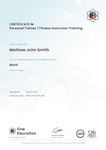Lean Six Sigma White Belt course
Level 3 Endorsed Certificate | 120 CPD Points | Exam & Full Tutor Support Included | 24x7 Access
One Education
Summary
- Certificate of completion - £9
- Certificate of completion - £79
- Exam(s) / assessment(s) is included in price
- Tutor is available to students
Add to basket or enquire
Overview
Standing out from the crowd is the best approach to boosting your earning potential. Attaining a Six Sigma white belt is one of the most effective ways to boost your potential in your existing role. Six Sigma is a simple and successful approach to quality improvement. If you want to learn more about the fundamentals, consider acquiring a white belt to improve your skills.
Six Sigma White Belt Certification is the entry-level certification. As a person advances up the Six Sigma ladder, their resume becomes more impressive than their colleagues. A Six Sigma Certification enables an employee to gain visibility at all levels of the organisation. With the help of their knowledge, abilities, and competence, they begin to contribute value to everything they do.
A Six Sigma White Belt is someone who has a rudimentary understanding of the Six Sigma process and works on Six Sigma projects as part of a team. White Belts are not in charge of directing or implementing Six Sigma initiatives, but they are expected to contribute to the team's efforts by participating in process improvement activities and assisting with change implementation.
White Belts are often given a quick overview of Six Sigma ideas and tools, such as process mapping and data analysis methodologies. Additionally, they are frequently responsible for finding and recording process problems and potential for change and collecting and evaluating data to support improvement efforts.
Learning Outcomes
After successful completion of this course, you will be able to
- Learn basic statistical concepts and their application in Lean Six Sigma
- Understand the role and responsibilities of a Lean Six Sigma White Belt
- Ability to work effectively as part of a team in a Lean Six Sigma project
- Understanding of the benefits and impact of Lean Six Sigma on an organisation.
- Differentiate between good quality and six sigma quality
- Understand the 7 tools for quality
- Describe the history of six sigma
Meet the Endorsement
The Quality Licence Scheme has been designed specifically to recognise high-quality courses. This Lean Six Sigma White Belt course course materials are recognised by Quality Licence Scheme (QLS). This ensures the deep research and quality resource allocation behind the development phase of the course. In addition, the QLS certificate enriches your CV and recognises your quality study on the relevant subject.
Meet the Accreditation
CPD Quality Standards (CPD QS) accreditation assure the Lean Six Sigma White Belt course course training and learning activities are relevant, reliable, and upto date.
Expert Support
Dedicated tutor support and 24/7 customer support are available to all students with this premium quality course.
Key Benefits
- Learning materials of the Design course contain engaging voiceover and visual elements for your comfort.
- Get 24/7 access to all content for a full year.
- Each of our students gets full tutor support on weekdays (Monday to Friday)
Achievement
CPD
Course media
Description
This Lean Six Sigma White Belt course materials are recognised by Quality Licence Scheme (QLS). This ensures the deep research and quality resource allocation behind the development phase of the course. In addition, the QLS certificate enriches your CV and recognises your quality study on the relevant subject.
Course Curriculum:
***Lean Six Sigma White Belt course***
Unit 01: Introduction
- Introduction
Unit 02: Quality
- Let’s set the scene
- What is quality?
- Why a focus on quality is important
Unit 03: Lean
- What is Lean?
- History of Lean
- The 8 Wastes
- Defects
- Overproduction
- Waiting
- Non-utilised talent
- Transport
- Inventory
- Motion
- Extra-processing
- VA vs. NVA
- Creating value
- Process
Unit 04: Six Sigma
- What is Six Sigma?
- History
- Good quality vs. Six Sigma quality
- DMAIC
- Belts & roles
- Six Sigma in action
Unit 05: The customer
- Voice of the customer
- Critical to quality
Unit 06: The tools of quality
- The 7 tools of quality – a high level reminder
- Process Map
- Check sheet
- Histogram
- Pareto Chart
- Fishbone Diagram
- 5 Whys
- Run Chart
Unit 07: Close out
- Close out
Course Assessment
To simplify the procedure of evaluation and accreditation for learners, we provide an automated assessment system. Upon completion of an online module, you will immediately be given access to a specifically crafted MCQ test. The results will be evaluated instantly, and the score will be displayed for your perusal. For each test, the pass mark will be set to 60%.
When all tests have been successfully passed, you will be able to order a certificate endorsed by the Quality Licence Scheme.
Note: This course doesn’t provide you with Six Sigma Certification. You can clear your basics and step up the ladder towards advancing your career.
Who is this course for?
The course is open for:
- Trainees and new recruits who want to pursue a career in Quality Management, Project Management
- Professionals working as Quality Engineers, Quality Managers, Process Improvement, Project Managers, etc
Requirements
This Lean Six Sigma White Belt course course is open to all, with no formal entry requirements.
Career path
Having this various expertise will increase the value of your CV and open you up to multiple jobs, such as:
- Business Process Analyst
- Operating System Specialist
- Project Manager
- Quality Assurance
- Engineering
- Lean Manufacturing
- Managers
- Entrepreneurs.
In the UK, the typical annual income for these professionals ranges from £35,000 to £100,000.
Questions and answers
Currently there are no Q&As for this course. Be the first to ask a question.
Certificates
Certificate of completion
Digital certificate - £9
Certificate of completion
Hard copy certificate - £79
QLS Endorsed Certificate
Hardcopy of this certificate of achievement endorsed by the Quality Licence Scheme can be ordered and received straight to your home by post, by paying —
- Within the UK: £79
- International: £79+ £10 (postal charge) = £89
CPD Accredited Certification
- Hardcopy Certificate (within the UK): £15
- Hardcopy Certificate (international): £15 + £10 (postal charge) = £25
Reviews
Legal information
This course is advertised on reed.co.uk by the Course Provider, whose terms and conditions apply. Purchases are made directly from the Course Provider, and as such, content and materials are supplied by the Course Provider directly. Reed is acting as agent and not reseller in relation to this course. Reed's only responsibility is to facilitate your payment for the course. It is your responsibility to review and agree to the Course Provider's terms and conditions and satisfy yourself as to the suitability of the course you intend to purchase. Reed will not have any responsibility for the content of the course and/or associated materials.




